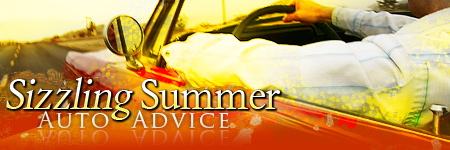
Summer Vacation Car Care Tips
As the sunny summer weather heats up, many people are finalizing their plans for an annual vacation. While deciding on a destination and a place to stay comes first, vehicle technicians argue that if you plan to drive, getting your vehicle ready for vacation is the most important aspect of your trip preparation.
"Following your maintenance schedule can prevent your vacation from becoming a mechanical nightmare, particularly if a breakdown could have been prevented,” said Juan Crespo, Master Technician for CarMax, the nation's largest used car retailer. "Take your car to a certified automotive technician for a full safety inspection at least one week before you plan to leave for vacation. If a problem is discovered, this allows enough time to have it fixed.”
1. The certified automotive technician should check the following during this inspection:
-
All fluid levels, including engine oil, transmission fluid, radiator fluid, power steering fluid, brake fluid, and windshield washer.
-
Tire pressure and tire tread depth and condition (Also, have the spare tire pressure checked).
-
Brakes
-
Belts and hoses
-
Windshield wipers
-
Lights
-
Air conditioning operation
2. Even if the automotive technician says everything checks out fine, there is always the possibility of car trouble on vacation. No matter how long your trip will be, you should have an Emergency Road Kit in your car for those unwelcome moments. Your kit should include:
-
Flashlights and flares
-
Jumper cables
-
Tire inflator
-
Extra fluids (oil, coolant, transmission)
-
A First Aid kit
-
A jack (make sure that the vehicle jack is operational and all the tools are present)
-
Gloves
-
Rags/paper towels
-
Water
-
Blanket
-
Multipurpose tools (commonly containing pliers, wire cutters, a knife, a saw, a bottle opener, screwdriver, file, and an awl)
3. Pack as lightly as you can to avoid adding unnecessary load on your tires; this can help save some gas, too! By packing lightly, you'll also avoid blocking the view in your mirrors while driving.
4. Following posted highway speed limits will increase your car's fuel efficiency because gas mileage declines by a few percent for each 5 MPH increase in speed above 45 mph.
5. Finally, buckle up, slow down, and have fun!
(Source: Carmax.com)
|